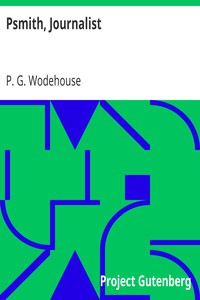Mike and Psmith by P. G. Wodehouse (web ebook reader txt) 📗

- Author: P. G. Wodehouse
Book online «Mike and Psmith by P. G. Wodehouse (web ebook reader txt) 📗». Author P. G. Wodehouse
At last he made a dive, and, with an exclamation of triumph, rose to his feet. In his hand he held a shoe.
"Put those back again, Smith," he said.
The ex-Etonian, wearing an expression such as a martyr might have worn on being told off for the stake, began to pick up the scattered footgear, whistling softly the tune of "I do all the dirty work," as he did so.
"That's the lot, sir," he said, rising.
"Ah. Now come across with me to the headmaster's house. Leave the basket here. You can carry it back when you return."
"Shall I put back that shoe, sir?"
"Certainly not. I shall take this with me, of course."
"Shall I carry it, sir?"
Mr. Downing reflected.
"Yes, Smith," he said. "I think it would be best."
It occurred to him that the spectacle of a house master wandering abroad on the public highway, carrying a dirty shoe, might be a trifle undignified. You never knew whom you might meet on Sunday afternoon.
Psmith took the shoe, and doing so, understood what before had puzzled him.
Across the toe of the shoe was a broad splash of red paint.
He knew nothing, of course, of the upset tin in the bicycle shed; but when a housemaster's dog has been painted red in the night, and when, on the following day, the housemaster goes about in search of a paint splashed shoe, one puts two and two together. Psmith looked at the name inside the shoe. It was "Brown bootmaker, Bridgnorth." Bridgnorth was only a few miles from his own home and Mike's. Undoubtedly it was Mike's shoe.
"Can you tell me whose shoe that is?" asked Mr. Downing.
Psmith looked at it again.
"No, sir. I can't say the little chap's familiar to me."
"Come with me, then."
Mr. Downing left the room. After a moment Psmith followed him.
The headmaster was in his garden. Thither Mr. Downing made his way, the shoe-bearing Psmith in close attendance.
The Head listened to the amateur detective's statement with interest.
"Indeed?" he said, when Mr. Downing had finished, "Indeed? Dear me! It certainly seems ... It is a curiously well-connected thread of evidence. You are certain that there was red paint on this shoe you discovered in Mr. Outwood's house?"
"I have it with me. I brought it on purpose to show to you. Smith!"
"Sir?"
"You have the shoe?"
"Ah," said the headmaster, putting on a pair of pince-nez, "now let me look at—This, you say, is the—? Just so. Just so. Just ... But, er, Mr. Downing, it may be that I have not examined this shoe with sufficient care, but—Can you point out to me exactly where this paint is that you speak of?"
Mr. Downing stood staring at the shoe with a wild, fixed stare. Of any suspicion of paint, red or otherwise, it was absolutely and entirely innocent.
21 — THE DESTROYER OF EVIDENCE
The shoe became the center of attention, the cynosure of all eyes. Mr. Downing fixed it with the piercing stare of one who feels that his brain is tottering. The headmaster looked at it with a mildly puzzled expression. Psmith, putting up his eyeglass, gazed at it with a sort of affectionate interest, as if he were waiting for it to do a trick of some kind.
Mr. Downing was the first to break the silence.
"There was paint on this shoe," he said vehemently. "I tell you there was a splash of red paint across the toe. Smith will bear me out in this. Smith, you saw the paint on this shoe?"
"Paint, sir?"
"What! Do you mean to tell me that you did not see it?"
"No, sir. There was no paint on this shoe."
"This is foolery. I saw it with my own eyes. It was a broad splash right across the toe."
The headmaster interposed.
"You must have made a mistake, Mr. Downing. There is certainly no trace of paint on this shoe. These momentary optical delusions are, I fancy, not uncommon. Any doctor will tell you—"
"I had an aunt, sir," said Psmith chattily, "who was remarkably subject—"
"It is absurd. I cannot have been mistaken," said Mr. Downing. "I am positively certain the toe of this shoe was red when I found it."
"It is undoubtedly black now, Mr. Downing."
"A sort of chameleon shoe," murmured Psmith.
The goaded housemaster turned on him.
"What did you say, Smith?"
"Did I speak, sir?" said Psmith, with the start of one coming suddenly out of a trance.
Mr. Downing looked searchingly at him.
"You had better be careful, Smith."
"Yes, sir."
"I strongly suspect you of having something to do with this."
"Really, Mr. Downing," said the headmaster, "this is surely improbable. Smith could scarcely have cleaned the shoe on his way to my house. On one occasion I inadvertently spilled some paint on a shoe of my own. I can assure you that it does not brush off. It needs a very systematic cleaning before all traces are removed."
"Exactly, sir," said Psmith. "My theory, if I may...?"
"Certainly Smith."
Psmith bowed courteously and proceeded.
"My theory, sir, is that Mr. Downing was deceived by the light-and-shade effects on the toe of the shoe. The afternoon sun, streaming in through the window, must have shone on the shoe in such a manner as to give it a momentary and fictitious aspect of redness. If Mr. Downing recollects, he did not look long at the shoe. The picture on the retina of the eye, consequently, had not time to fade. I remember thinking myself, at the moment, that the shoe appeared to have a certain reddish tint. The mistake...."
"Bag!" said Mr. Downing shortly.
"Well, really," said the headmaster, "it seems to me that that is the only explanation that will square with





Comments (0)